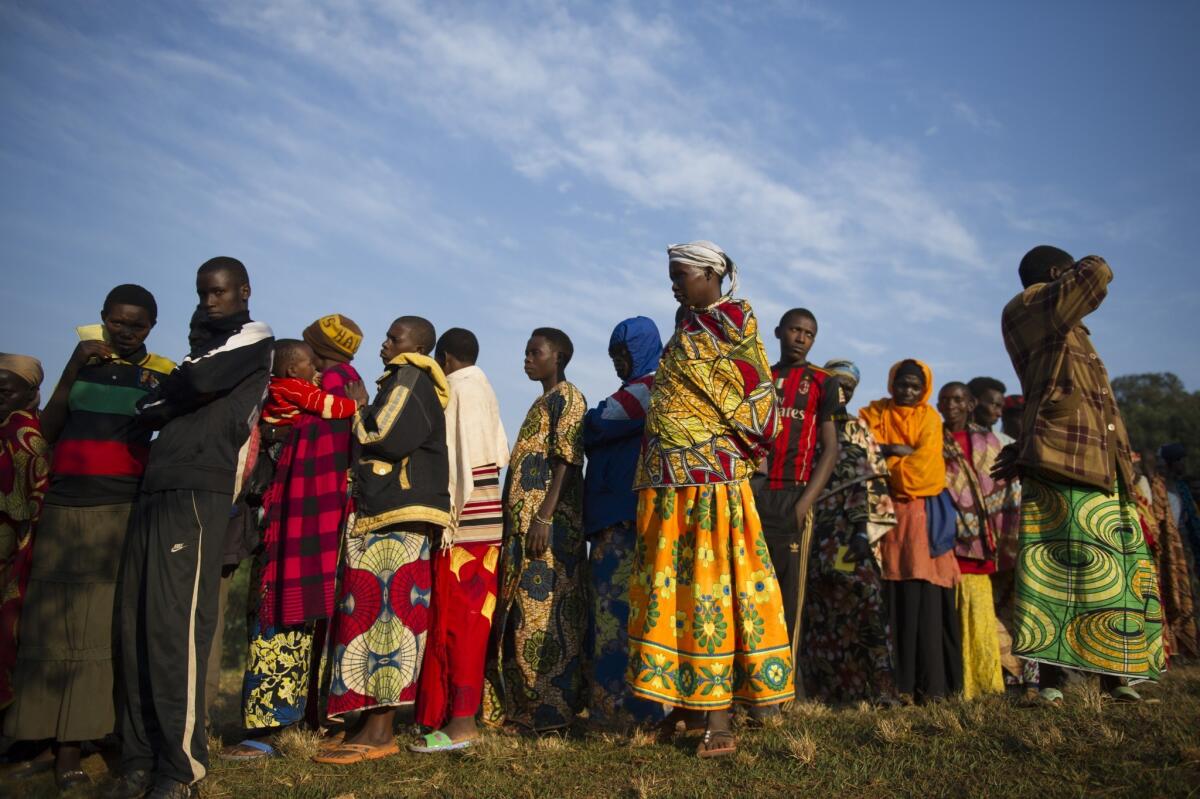Amid violence, Burundi’s election expected to give leader disputed 3rd term

Residents line up prior to casting their vote in the village of Buye, Burundi, on July 21, 2015.
- Share via
Reporting from Nairobi, Kenya — Burundian President Pierre Nkurunziza, who ignored local, African and global criticism of his bid for a third term, appeared likely to win Tuesday’s contentious election when results are announced in several days.
Nkurunziza has faced an abortive military coup and furious street protests in recent months as he relied on a contentious technicality to claim that seeking reelection did not breach Burundi’s constitutional two-term limit. The restriction was also part of a peace deal that ended the country’s civil war.
Burundi’s opposition boycotted Tuesday’s vote, boosting Nkurunziza’s reelection prospects. They called the balloting a sham after efforts to negotiate a compromise over the election failed during the weekend.
But casting his ballot Tuesday in his stronghold of Ngozi province, Nkurunziza told journalists: “These elections prove that democracy in Burundi is improving.”
Gunfire and explosions were reported in the capital, Bujumbura, overnight before Tuesday’s vote, and an opposition official was found slain, Reuters news service reported. Two police officers also were killed, deepening fears the disputed election will trigger more violence.
At least 70 people have died in recent months, many of them in clashes between police and opposition supporters.
Burundi’s election comes even as some African countries, such as Tanzania, Burkina Faso and Nigeria, have shrugged off the cliché that has plagued the continent for decades: of “big men” ruling for decades, while democratic institutions such as courts, the media and parliament shrivel.
For his part, Nkurunziza, a former rebel fighter and born-again Christian, has clamped down on independent media and tightened his grip on the military and security service since crushing the coup attempt in May.
A thuggish pro-government youth militia, the Imbonerakure, unleashed violence in opposition neighborhoods, according to U.N. High Commissioner for Human Rights Zeid Raad Hussein.
About 170,000 Burundians fled the country, many fearing election violence and a slide back into war.
U.S. State Department spokesman John Kirby warned Tuesday that the elections wouldn’t be credible as Washington weighed sanctions against those responsible for violence or instability.
“The legitimacy of the electoral process in Burundi over the past few months has been tainted by the government’s harassment of opposition and civil society members, closing down of media outlets and political space, and intimidation of voters,” Kirby said in a statement.
He warned the contention around the vote could unravel the country’s “fragile processes.”
Kirby said the Burundi’s peace agreement, which a decade ago ended a civil war that left about 250,000 people dead, was clear that no president could serve more than two terms.
Nkurunziza’s supporters argue that because he was appointed by parliament for his first term, not voted in by the population, he can seek another term, despite the constitutional limit. Burundi’s constitutional court upheld the view. However, Judge Sylvere Nimpagaritse of the court fled the country in May, telling journalists that jurists came under intense government pressure and faced death threats.
In a further sign of the divisions and fear in Burundi’s ruling party, Vice President Gervais Rufyikiri fled the country last month, saying he felt his life was at risk after opposing Nkurunziza’s third-term bid.
In a highly unusual move, the African Union, which often turns a blind eye to flawed elections, declined to send an observer team, asserting that conditions were not conducive for free and fair balloting.
Burundi’s election turmoil runs counter to some positive signs for democracy on the continent. In Tanzania, President Jakaya Kikwete has announced he will stand down later this year after two terms in office. Last year, protests in Burkina Faso toppled former President Blaise Compaore amid his efforts to cling on after 27 years in power. And Nigeria saw a historic peaceful transfer of power in March elections.
But some of Burundi’s neighbors, notably Uganda and Rwanda, have shown signs of worrying regression. Ugandan President Yoweri Museveni recently prepared to run for office yet again next year, having ruled his country since 1986. The parliament in neighboring Rwanda endorsed a third-term bid by President Paul Kagame, who has quashed opposition voices and stifled dissent.
Follow @robyndixon_LAT on Twitter for news out of Africa
More to Read
Sign up for Essential California
The most important California stories and recommendations in your inbox every morning.
You may occasionally receive promotional content from the Los Angeles Times.













